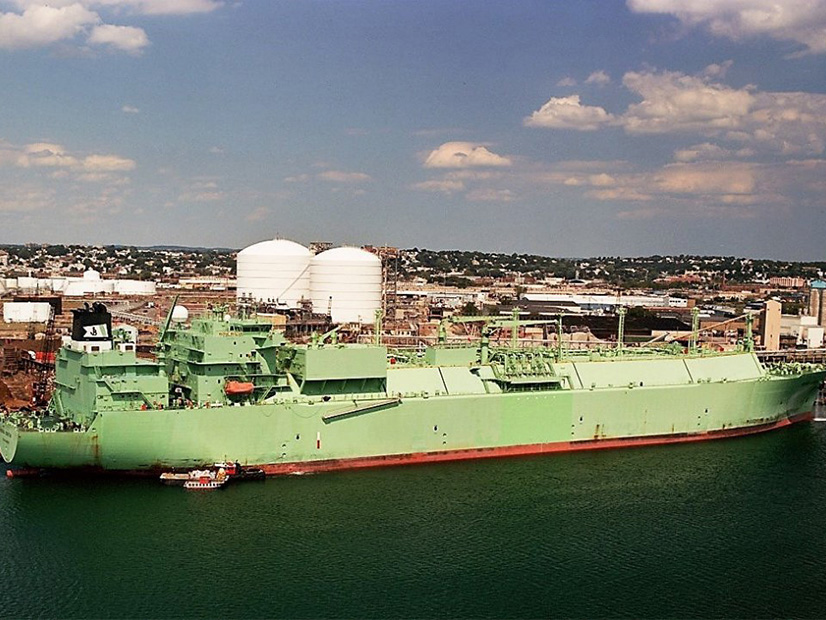
The fate of the LNG import terminal in Everett, Mass., has come into increasingly sharp focus in the last few months as ISO-NE has continued to sound the alarm about winter grid reliability in the region.
But as of right now, there’s no consensus about how to keep the facility operating past 2024, when the contract sustaining its “anchor tenant,” the Mystic gas generating plant, expires.
ISO-NE laid out the problem in a statement it published ahead of a FERC forum in Vermont earlier this month: “The region must ensure the continued operation of the Everett LNG facility to maintain reliable electric and natural gas service for New England consumers.”
In a recent interview with RTO Insider, however, ISO-NE CEO Gordon van Welie made clear that the grid operator is not interested in using its own authority to do so. (See related story, Gordon van Welie Stares down Another Winter in Charge of ISO-NE.)
“We’re a balancing authority. We balance supply and demand. It’s not our job to make sure that there’s fuel supply,” van Welie said.
The one route by which ISO-NE might help keep Everett alive is through an extension of the reliability-must-run (RMR) contract keeping the next-door Mystic plant operating through 2024.
But van Welie indicated that ISO-NE is loathe to expand the contentious Mystic agreement, which has been the subject of bottomless litigation.
“It could be done by retaining Mystic, but nobody wants us to retain Mystic, and we don’t want to retain Mystic,” he said. “If we extend the Mystic agreement, then we’re socializing the cost of Everett across all electricity ratepayers … and it basically makes it cheaper for the gas” distribution companies.
Constellation Asks for Help
Constellation Energy (NASDAQ:CEG), which has operated the facility since 2018, also acknowledges it will need action from elsewhere to keep the terminal running.
At the FERC forum in Vermont earlier this month, the company’s senior vice president and deputy general counsel, Carrie Allen, made the case that the region should step up and find a way to ensure that Everett can continue to operate. The facility provides pressure support for pipelines it’s connected to and regularly sends out gas to other generators and systems besides Mystic, Allen argued.
And, she said, its gas is cleaner than the oil that would likely replace it if the facility were to go out of service in two years: Constellation has estimated without Everett, carbon dioxide emissions in the region would double and NOx emissions would go up by 74%.
“I do think Everett can critically contribute to reliability in New England,” Allen said. “It’s already permitted; it’s existing. It’s been operating reliably for 50 years. It’s not a question of will it be here. It’s here. The question is, do we want to keep it here?”
Like ISO-NE, Constellation isn’t keen on continuing the contentious Mystic RMR agreement, Allen said, but it’s worried about what comes next without the gas plant serving as an anchor tenant.
“Our experience is that there’s been quite a bit of interest in contracts for supply from our facility post-RMR. But there seems to be a bit of a regulatory problem, and we’re trying to work it through, in terms of the state approval process,” she said.
The potential buyers believe that they need to use fixed commodity pricing to get approval by state regulators.
Allen said she doesn’t believe that’s the case, and that it’s also not something that her company can provide during a potential nine-month wait for state approval.
“I think we need to talk about whether people want Everett to be a bridge to the long-term future. Does New England want to retain it? If so, we don’t have that much time. We have no commitments post cost-of-service that would require us to keep operating,” she said. “We’re faced with a choice, and it’s coming on us very soon for what to do.”
Another Way?
In a recent press briefing with local and national environmental groups, advocates said they were still looking at the details of ISO-NE’s warnings about the need to keep Everett afloat.
But more broadly, they say, the region should be doing more to move off of gas and into clean energy.
In a recent white paper, eight environmental groups challenged ISO-NE’s prediction that gas facilities will need to be in place for the foreseeable future to meet reliability needs.
“In fact, energy storage can serve similar balancing functions as gas, while providing relief to the electric system during winter cold spells and reducing transmission needs,” they wrote.
The groups said that ISO-NE and state leaders should “re-target or supplement” programs like Massachusetts’ Connected Solutions battery program or ISO-NE’s Inventoried Energy Program to incentivize energy storage development.
“I would like to see the day that ISO-NE identifies a clean energy project that they’re really enthusiastic about bringing online in an expedited manner,” said Jeremy McDiarmid, vice president at the Northeast Clean Energy Council, commenting on the grid operator’s urgency related to the Everett facility.
